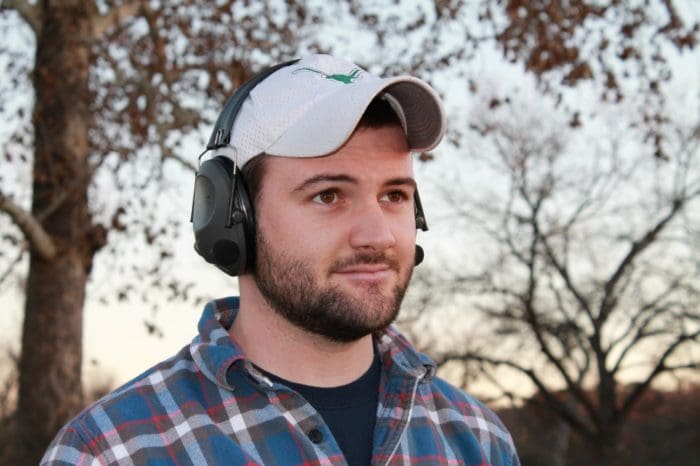By Warren Grannis
They say write what you know. After sifting through everything I know about firearms over the last few weeks, I’ve decided I’m probably not in the running to speak as an expert on most aspects of gun culture, as others are far better informed than I. But I am deaf. And I’ve been deaf for as long as I can remember, so I know that pretty well.
Despite my deafness, I still wear hearing protection when I shoot, and I’d like to tell you why . . .
For much of my childhood, and even a brief while in early adulthood, I scoffed at the idea of wearing hearing protection while shooting because, after all, “you can’t lose what you don’t have.” Let me relate the experience that changed my mind about hearing protection.
About a decade ago, I acquired a handgun and wanted to take it through its paces and get a feel for how well it performed. In most circumstances, I’d take the gun to the family ranch, out behind the old dam that makes for an excellent berm.
For whatever reason, I just didn’t have the patience, and felt compelled to plunk down the change to spend an hour at the nearby indoor range in South Austin. It’s an older range, but local hunters like using it to dial in their rifles, as it goes out to 100 yards. This is important to the story.
So there I was, dropping the money to rent a lane for an hour. The RSO behind the counter asked if I had my “eyes and ears,” and I confidently told him that while yes, I had eye protection, I wouldn’t be needing the ear protection because (and I’m ashamed of how often I’ve used this line growing up, as an excuse to go without) “you can’t lose what you don’t have.”
Now, I’d never shot at Red’s before. I’d only lived in the Austin area for a few years, and was new to the idea of indoor ranges. I’d always been able to shoot outside.
This place is LOUD. Somehow, even a normal .308 can sound like a howitzer going off. I took my lane, which was on the far right, up against the wall, set up the target, my gear, and the gun on the table. I picked it up, aimed, and BOOM.
My ears were instantly ringing. It wasn’t my 9mm, as I hadn’t even squeezed off a round yet. Some fellow, with his bolt action rifle (caliber unknown) had put his target on the 100 yard line and proceeded to sight in his gun. I shot mine, and the percussion seemed more intense than usual. The rifle to the left though…every time he fired, the ringing started anew and a sense of nausea began to grow.
I couldn’t take more than 15 minutes of it. Vertigo was kicking in big time. The tinnitus sounded like every air raid siren in Honolulu was going off, a cold sweat was breaking out. I was going to be lucky to make it out of the range without chucking lunch all over the shop floor.
I paid my rental fee drenched in a cold sweat and apparently looking like death, and cautiously made it out to the car and packed up my gear. That’s when the first round of losing my lunch commenced. And here, I made mistake number two.
I drove back to the office. Call it pride, call it stupidity, call it ignorance. But I was definitely in no shape to drive. Thirty-seven-year-old me would kick twenty-four-year-old me’s backside for getting behind the wheel in that condition.
I (luckily) made it back to the office in one piece, and proceeded to lay on the floor under my desk, shut my eyes, and curled into a ball and tried to sleep it off. The sirens of tinnitus never relented.
There was no escaping the reality of what had happened: I might not be able to hear, but I’d done something incredibly asinine by not protecting my inner and middle ears, and I was paying a heavy price for it.
Several hours later and after a few more rounds of tossing my lunch, when the Earth had steadied into a predictable rocking motion, and I could look at the horizon and not want to die, I drove home. I still wasn’t in good shape, but I felt like I could definitely get home in one piece, at least.
As soon as I made it home, I took some Sudafed for the vertigo, some Gatorade for the lost electrolytes, crawled into bed and grabbed onto the edges, clenched my eyes shut, and prayed for relief.
I’m fine now. It took a week or two for the tinnitus to fade away. The headache, the nausea, the vertigo, all of it eventually receded. But left behind was an indelible lesson: ear protection isn’t just for protecting your hearing.
Aside from hair cells inside your cochlea that turn sound waves into signals your brain translates into auditory input, there’s a lot more going on. And that protection helps make sure your body can do that for a long time. There are bones, fluids, tubes…all kinds of physiological processes going on that make for a bad time if you don’t protect them when you go out shooting.
I’ll admit it. Even now it still feels a little ridiculous putting in ear plugs when I’m going shooting. Going from silent to…just as silent…seems a little pointless. “You can’t lose what you don’t have.” Which is, on the face of it, true enough.
But the moment I squeeze that trigger and feel that hug of sorts from the percussion of the bullet leaving the barrel, a small part of me still feels the psychological fallout of that horrible day in South Austin, and I feel gratitude for a hard lesson learned.
